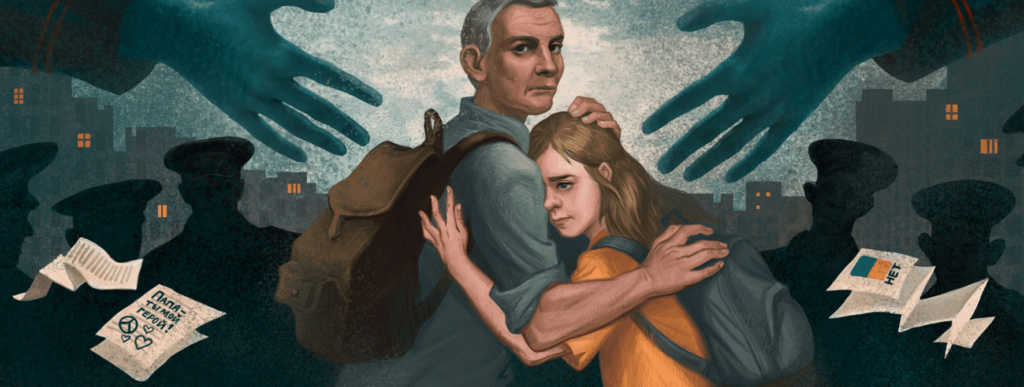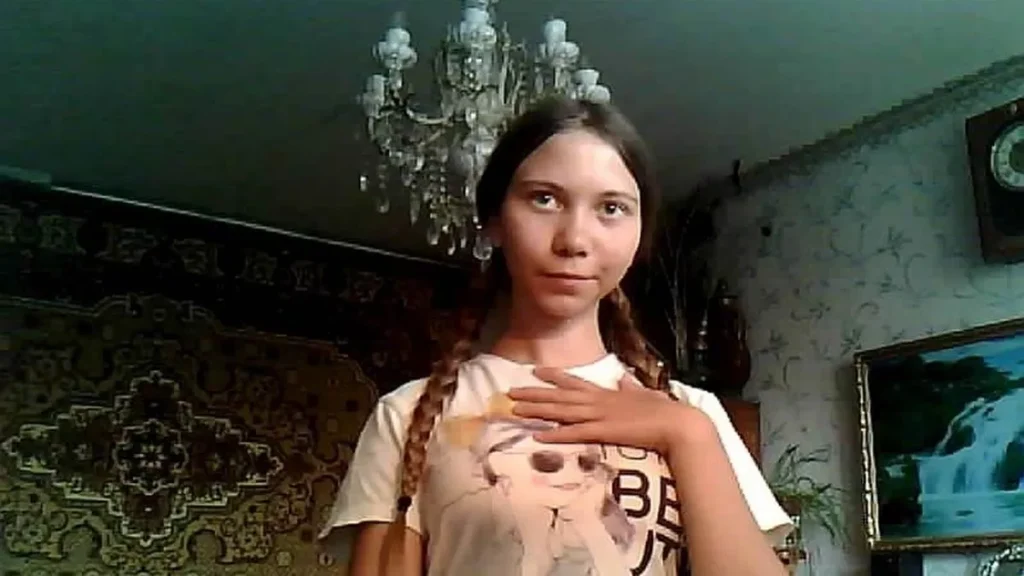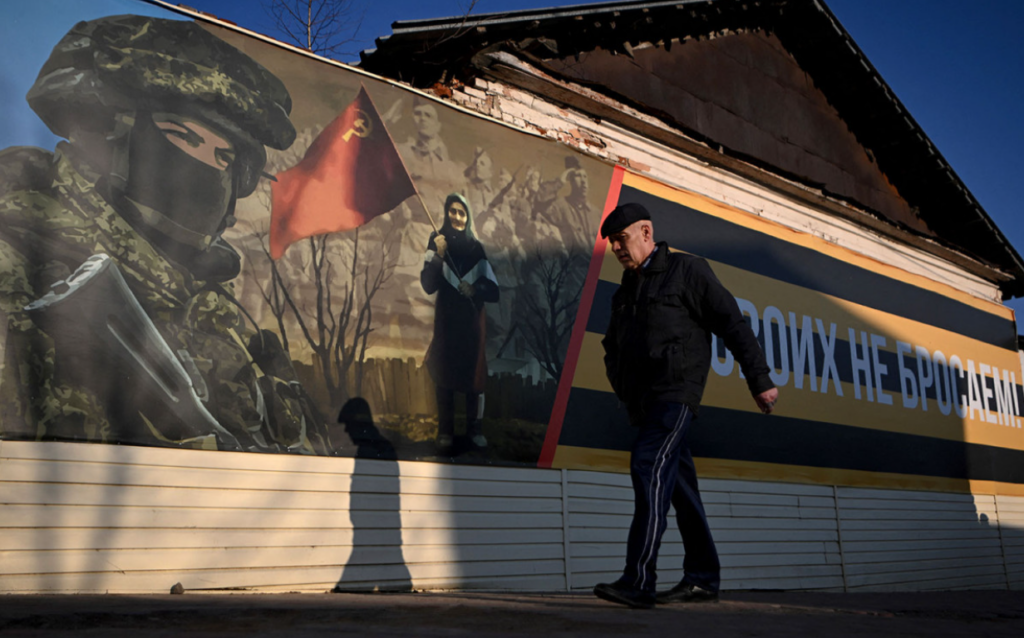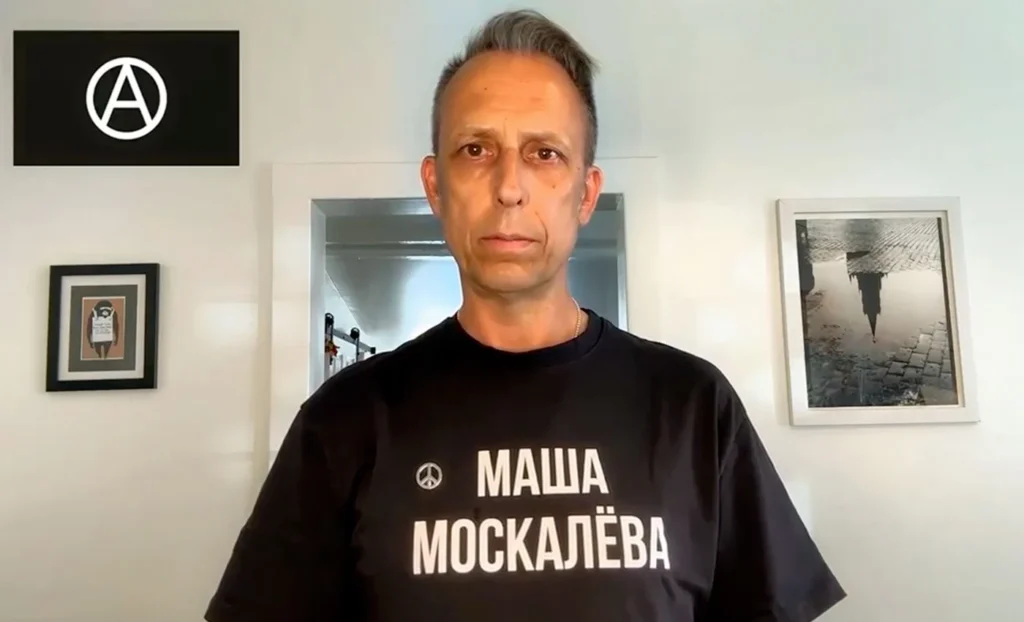
In April 2022, during the Russian invasion of Ukraine, an anti-war drawing by Maria Moskaylova (better known as Masha), a sixth-grader in the Russian town of Yefremov, led to the political persecution of the girl and her single father Aleksey Moskalyov.
A resident of Efremov, Tula region, Alexey Moskalyov is raising his daughter Masha alone. After she drew an anti-war picture in art class in April of 2022, the family faced persecution. First, Alexey was given a monitary fine. In March of 2023 the trouble renewed. Masha was taken to the police, a criminal case was opened against her father. On March 28, he was sentenced to two years. Alexey ran away the day before. Two days later he was detained in Minsk. Masha was in a rehabilitation center at that time. Now she will be transfered to social services. Read the full chronology from OVD Info.

Events
An administrative case was brought against Alexey Moskalyov (born in 1968) after his daughter, a 6th grade student, Maria Moskaleyova, drew an anti-war drawing in an art class at school on April 24, 2022. The drawing depicted a Russian flag with the inscription “No to war” and a Ukrainian one with the inscription “Glory to Ukraine”, and between them a woman shielding her child from missiles flying from Russia.
The art teacher reported the “bad” drawing to the school principal, and she, according to Masha and her father, called the police to the school (now the director denies calling the police). Masha told her father that the police checked and questioned the children at the exit from school, but Moskaleva gave someone else’s name and ran home.
Alexey shared a photo of his teenage daughter.

The next day, when her father brought her to school, the police detained both of them and took them to the Ministry of Internal Affairs. At the same time, Alexey Moskalev’s social networks were examined, and a comment was discovered in Odnoklassniki that Alexey left on his page: “Russian Army. Rapists are near us . ” The court, held on the same day, decided to find Aleksey Moskalyov guilty of committing an administrative offense of having “discredited” the army with such comments and impose an administrative fine on him in the amount of 32,000 rubles.
The next day, FSB officers came to the school to talk with Maria Moskaleva; her father was also called to the school, where, according to Moskaleva, they talked with him and his daughter for several hours. From that day on, Masha stopped going to school; according to some sources, her father transferred her to home schooling; according to others, he simply took her away from school.
Seven Months of Peace
For seven months the family lived relatively calmly, but on December 27, 2022, a criminal case was opened against Alexey Moskalev under Part 1 of Art. 280.3 of the Criminal Code of the Russian Federation (“ Public actions aimed at discrediting the use of the Armed Forces of the Russian Federation ”). The presence of a decision on an administrative offense dated April 25, 2022 that entered into legal force made it possible to prosecute Moskalev in criminal proceedings.
On the morning of December 30, 2022, a search was carried out in the Moskalevs’ apartment, computer equipment, phones, and money were seized. After the search, Alexey Moskalev was taken for questioning to the FSB, then released as a suspect in a criminal case, having taken a written undertaking not to leave.
After the New Year, the family moved to a rented apartment in the village of Partizan, an hour and a half drive from Efremov. On January 10, 2023, the criminal case was transferred from the Ministry of Internal Affairs to the Investigative Committee of Russia in the Tula region.
On February 27, 2023, Alexey Moskalev was put on the wanted list, and on March 1, he was detained at his new place of residence by FSB officers. At the same time, Moskalev was charged under Part 1 of Art. 280.3 of the Criminal Code of the Russian Federation , and on March 2, 2023, the Efremovsky court of the Tula region put him under house arrest.
Later, Alexey Moskalev reported that during interrogation by the FSB, he was beaten with his head on the floor and against walls, and was also forced to listen to the Russian anthem at maximum volume for three hours in a row.
Elena Agafonova
On the day of her father’s arrest, Masha Moskaleva was transferred to social rehabilitation center for minors No. 5 in the Tula region. When the next day her father was given a preventive measure in the form of house arrest, the investigator allowed him to take his daughter from the shelter. However, as Moskalyov’s lawyer was informed, the Commission on Minors’ Affairs of the Tula Region intervened in the case; by its decision, Maria Moskalyova was kept in a shelter and prevented from communicating with her father and family friends.
Since March 1, 2023, none of the relatives have seen the girl or heard from her. The lawyer only knows that she is scared, withdrawn and in a dejected state. The girl is not given a mobile phone that was specially purchased for her, and they are not accepting transfers.
March 4, 2023 – Mascha not Released from Orphanage
On March 12, 2023, it became known that a lawsuit was filed against Alexey Moskalev to restrict parental rights. The Commission on Juvenile Affairs of the city of Efremov, Tula Region, appealed to the court. The court hearing in the Moskalyov case is scheduled for April 6.
Alexey Moskalev does not admit his guilt.
March 24: How a Russian child’s drawing sparked a police investigation
On 28 March 2023, a Russian court sentenced Aleksey to two years in prison. This is the first time in the Russian Federation that a court, after imprisoning a parent for political reasons, left the child without a guardian.
March 30: Alexei Moskalev arrested on run in Minsk
Olga Sitchikhina
March 30: Masha Moskalyova’s mother explained why she left her daughter earlier
April 6: Girl who drew anti-war image handed to mother
April 6: Russian girl in anti-war art case given to mother: official
Since then – check out this page – for how the families is doing since April 2023.
(Another timeline on Wikipedia)
Case of Family Moskalyov/a Shows Russian Z Fascism
“Patriotic” pictures from Efremov, Tula region

BBC Report
Alexander Ivanov Speaking up
On April 15th, Alexander “Chacha” Ivanov, the frontman of one of Russia’s oldest punk bands, NAIVE, took the stage at a Moscow club wearing a shirt bearing the name of Mascha Moskaleva.
Anti-War Stance at Concert in Moscow in April 2023 (With German subtitles)

“Our support for Masha will be evidence that we can unite and find compassion in our hearts!”
— Chacha
This turned out to be NAIVE’s last concert in Russia.
A Touching Letter
Days later, Ivanov left the country.
In a letter written on the road, he explains why showing public solidarity was so important to him.
Excerpt from his letter:
>> I also recognized that against all odds, not everything was lost for us, the Russian people! There, beside me, were several thousand people who shared my language, culture, and even subculture. Together, despite all restrictions and repression, they overcame their inner fear and expressed their clear and unequivocal opinion on this “special military operation.”
At that moment, I was overwhelmed with sadness that, throughout their existence, Russian authorities have consistently perceived grassroots organization of the masses as their main threat. For centuries, Russian authorities’ overriding concern has been to prevent people from uniting at any level, discredit or control any self-governed, public initiative that isn’t engineered by the state itself.
The Russian government has long worked to make the people feel alienated, and this process did not start recently or even 30 years ago. As I re-read Nikolai Gogol’s “The Government Inspector” with my daughter Aurora, I am reminded of this. Nothing else can explain the unparalleled level of alienation and “atomization” of Russian society (predominantly, the ethnic Russian part) that has been documented for decades in various sociological research. Due to mutual distrust and envy, Russians, even in our own lands, are the most alienated people of the world. <<
Memorial – Why is Alexey Moskalyov a political prisoner?
Grounds for recognition as a political prisoner
A week after the start of the full-scale Russian invasion of Ukraine, on March 4, 2022, the State Duma of Russia adopted emergency laws (not in the form of individual bills, but by amending others already adopted in the first reading) to amend the Code of Administrative Offenses and the Criminal Code. These laws concerned calls for sanctions, the spread of fakes about the Russian armed forces, discrediting them, as well as calls to “prevent their use.” On the same day, the laws were approved by the Federation Council, and in the evening they were signed by the president. The amendments came into force on the date of official publication – March 5, 2022.
The corpus delicti under the new Art. 280.3 of the Criminal Code of the Russian Federation is formulated as follows: “Public actions aimed at discrediting the use of the Armed Forces of the Russian Federation in order to protect the interests of the Russian Federation and its citizens, maintaining international peace and security, including public calls to prevent the use of the Armed Forces of the Russian Federation for these purposes, and equally aimed at discrediting the execution by state bodies of the Russian Federation of their powers outside the territory of the Russian Federation for the specified purposes, committed by a person after he was brought to administrative responsibility for a similar act within one year.” Bringing to administrative responsibility “for a similar act” occurs according to Art . 20.3.3 Code of Administrative Offenses of the Russian Federation .
The above wording of Art. 280.3 of the Criminal Code of the Russian Federation does not meet the principle of legal certainty, about which the Constitutional Court of the Russian Federation says that this “general legal criterion of certainty, clarity, unambiguity of a legal norm follows from the constitutional principle of equality of all before the law and the court, since such equality can be ensured only subject to a uniform understanding and interpretation of the norm by all law enforcement officials . ” Also, the Constitutional Court, sharing the position of the ECHR, quoted: “The law in any case must meet the standard established by the Convention, which requires that legislative norms be formulated with sufficient clarity and allow a person to foresee, resorting to legal assistance if necessary, what consequences may be associated with one or another of his actions” ( Resolution of the Constitutional Court of the Russian Federation dated May 27, 2008 No. 8-P).
The very concept of “discredit”, which is key to the interpretation and application of Art. 280.3 of the Criminal Code of the Russian Federation , does not have a clearly defined legal meaning. The legislator does not provide a definition of “discredit” either in Art. 20.3.3 Code of Administrative Offenses of the Russian Federation , nor in Art. 280.3 of the Criminal Code of the Russian Federation , nor in both of these codes as a whole. The only definition of this concept contained in the legislation is formulated in Federal Law No. 135-FZ “On the Protection of Competition” and describes discredit as the dissemination of false, inaccurate or distorted information that may cause losses and/or damage to business reputation. However, firstly, this understanding relates to a different branch of law and describes other social relations, and according to Art. 3 of the Criminal Code of the Russian Federation , the application of criminal law by analogy is not allowed, and secondly, based on this understanding of discredit, the interpretation of the crime under Art. 280.3 of the Criminal Code of the Russian Federation , would actually coincide with the composition of another article of the Criminal Code that contradicts the principles of law – Art. 207.3 of the Criminal Code of the Russian Federation , which prohibits the public dissemination of knowingly false information about the use of the Armed Forces of the Russian Federation.
The literal meaning of the term “discredit” in Russian, contained in the dictionaries of Ozhegov, Ushakov, Efremova and others, is undermining trust in something, belittling someone’s authority. Thus, in fact, Art. 280.3 of the Criminal Code of the Russian Federation, under the threat of severe punishment, prohibits belittling the authority of the authorities and undermining trust in it, its bodies, decisions and actions. This understanding of the meaning of the article is confirmed by the fact that its disposition as part of public actions aimed at discrediting the use of the RF Armed Forces includes calls to prevent such use, thereby directly prohibiting the expression of opinions on the actions of authorities. Thus, Art. 280.3 of the Criminal Code of the Russian Federation can be used to prohibit any public actions that, in the opinion of the law enforcement officer, call into question the necessity, admissibility, legality or expediency of the use of the Armed Forces and the declared purposes of their use.
Such prohibitions are obviously prohibitions on the expression of opinion and public debate regarding major political decisions and actions of government bodies. In a democratic society, the authority of the government and trust in it are the result of political competition, and their “undermining” and “derogation” are legitimate goals of the actions of opponents of the government.
According to Art. 19 of the International Covenant on Civil and Political Rights , “everyone has the right to hold his opinions without interference, … has the right to freedom of expression; This right includes freedom to seek, receive and impart information and ideas of all kinds, regardless of frontiers, orally, in writing or in print or in artistic expression or other media of one’s choice. “
Limitations on the exercise of these rights “must be prescribed by law and are necessary: for respect of the rights or reputations of others; for the protection of state security, public order, health or morals of the population . “
Similar guarantees are contained in Art. 29 of the Constitution of the Russian Federation , guaranteeing freedom of thought and speech. Restrictions on these freedoms are associated with the prohibition of propaganda or agitation that incites social, racial, national or religious hatred and enmity, propaganda of social, racial, national, religious or linguistic superiority, as well as state secrets.
Restrictions on freedom of expression established by Art. 280.3 of the Criminal Code of the Russian Federation , obviously do not serve the purposes for which such restrictions could be established.
Similarly, this article of the Criminal Code makes the rights and freedoms of man and citizen dependent on his convictions, contrary to the guarantees provided for in Art. 19 of the Constitution of the Russian Federation , it also infringes on the right to freely choose, have and disseminate beliefs and act in accordance with them, guaranteed by Art. 28 of the Constitution of the Russian Federation .
In addition, Art. 280.3 of the Criminal Code of the Russian Federation makes the presence of a crime dependent on the fact that a person has previously been brought to administrative responsibility. Thus, bringing to criminal liability and making a decision within the framework of a criminal process are based on a court decision made in the procedure for proceedings in cases of administrative offenses, which presupposes a significantly lower level of guarantees of respect for the rights and freedoms of the person held accountable than is provided for by the norms of criminal law. process.
In accordance with Part 5 of Art. 4.1. Code of Administrative Offenses of the Russian Federation ( “General rules for imposing administrative punishment” ) no one can bear administrative responsibility twice for the same administrative offense. Similar to Part 2 of Art. 6 of the Criminal Code of the Russian Federation ( “Principle of Justice” ) establishes that no one can be held criminally liable twice for the same crime. These norms, both collectively and individually, establish the principle according to which a person is liable for the same unlawful act committed only once; the prohibition of repeated punishment is provided for in Art . 4 of Protocol No. 7 to the Convention for the Protection of Human Rights and Fundamental Freedoms , while Art. 280.3 of the Criminal Code of the Russian Federation actually establishes criminal liability for actions for which a person has already been subject to administrative punishment.
Thus, we believe that Art. 280.3 of the Criminal Code of the Russian Federation contradicts both the Russian Constitution, the international obligations of the Russian Federation, and the basic principles of law.
The mentioned organic defects Art. 280.3 of the Criminal Code of the Russian Federation determines its illegal nature, which does not even allow for its conscientious application. However, the very fact of the urgent inclusion of this article in the Criminal Code immediately after the start of armed aggression against Ukraine, and the rhetoric of officials that accompanied its consideration and adoption, and, most importantly, the context of its application – the ongoing military operations and the accompanying state military propaganda – exclude such good faith. In a situation where the only truthful information and acceptable assessments are information and assessments from official Russian sources, which not only justify an aggressive war and absurdly attribute to it the goals of protecting the interests of the Russian Federation and its citizens, maintaining international peace and security, but also prohibit naming events with any points of view, which is war, the word “war”, the application of this article of the Criminal Code of the Russian Federation, which is illegal in nature, also has an exclusively unfair and illegal nature.
This conclusion is fully confirmed by the practice of applying Art. 20.3.3 Code of Administrative Offenses of the Russian Federation , which has an identical disposition to Art. 280.3 of the Criminal Code of the Russian Federation . According to it, both citizens who speak out with anti-war slogans and those who demonstrate in one way or another their personal attitude to the current events are persecuted. Under this article, picketers with posters “Peace to the world”, quotes from classics of world literature, and simply with a poster “*** *****” were persecuted. Some examples from practice can be found, for example, here .
In fact, under Article 280.3 of the Criminal Code of the Russian Federation , any citizen who expresses in one way or another any attitude towards the use of the Armed Forces of the Russian Federation, as well as the declared purposes of this use, other than unequivocal approval of both, can be subjected to persecution.
Based on the above, the Independent Human Rights Project “Support for Political Prisoners. Memorial believes that Art. 280.3 of the Criminal Code of the Russian Federation is anti-legal in nature, created to carry out political repression against critics of the government and should be repealed. Any prosecution under this article is unlawful and must be stopped.
Like others persecuted under this article, Alexey Moskalev expressed his own opinion about the policies pursued by the authorities of his country and, above all, about the aggressive war they unleashed. To respond critically to the actions of the authorities and the war, as mentioned above, is the inalienable right of a citizen.
Additionally, it can be stated that pressure is being exerted on Alexey Moskalev through his daughter, who was actually isolated from him and from their family friends, and was also threatened with being sent to an orphanage for a long time. In addition, the isolation of Maria Moskaleva in the shelter makes it impossible to enforce the house arrest order for Alexei Moskalev, since the latter has no other relatives except his daughter, and leaving the house even for shopping and communicating with anyone other than relatives living together, a lawyer and employees Alexey is prohibited from law enforcement agencies. We believe that the story of the removal of Maria Moskaleva from her family is a demonstrative act of repression and an attempt to intimidate all opponents of the war not only with prison terms, but also with the destruction of their families and putting pressure on children. In the current situation, the right of a minor to live in a family is obviously violated.
According to Art. 54 of the Family Code of the Russian Federation , a child has the right to live and be raised in a family. As far as we know, there is no evidence that Masha was in danger, subjected to violence or humiliation in her family. Neighbors and friends describe the family as prosperous, and Alexey as a caring father. Alexey Moskaleva is currently not deprived of parental rights and is not limited in them, thus, there are no grounds for keeping Maria Moskaleva in isolation from her family. In fact, not only Alexey Moskalev, but also his minor daughter is subject to persecution and unjustified violation of rights.
Independent human rights project “ Support for political prisoners. Memorial ”, which continues the work of the thematic Program of the Human Rights Center “Memorial” illegally liquidated by the state, according to the international Guidelines for defining the concept of “political prisoner” , finds that the criminal case against Alexey Moskalev is politically motivated, aimed at the involuntary cessation or change in the nature of the public activities of critics of the government , as well as intimidation of society as a whole, i.e. consolidation and retention of power by subjects of power, and deprivation of liberty was applied to him in violation of the right to freedom of speech and a fair trial, other rights and freedoms guaranteed by the Constitution of the Russian Federation, the International Covenant on civil and political rights and the European Convention for the Protection of Human Rights and Fundamental Freedoms. Moreover, we believe that persecution of people for their anti-war stance is related solely to their political views and their exercise of freedom of expression.
Independent human rights project “ Support for political prisoners. Memorial considers Alexey Moskalev a political prisoner and demands his immediate release and termination of his criminal prosecution.
Recognizing a person as a political prisoner does not mean either agreement with his views and statements, or approval of his statements or actions.
Lawyer – Vladimir Bilienko.
How to help?
You can sign the petition for the return of Masha Moskaleva to the family here .
Group for coordinating assistance to the Moskalev family on Telegram .
On our website you can make a donation to help all political prisoners.
Publications in the media:
March 1, 2023 Kommersant. My father has a deadline // http://kommersant.ru/doc/5844482
March 8, 2023 Mediazone. No right to call. A schoolgirl from the Tula region who drew an anti-war drawing is not released from the orphanage and is forbidden to communicate with her father // http://zona.media/article/2023/03/08/priut
March 17, 2023 Spectrum. “They will take my daughter away from me, and they will imprison me.” A schoolgirl from Efremov may end up in an orphanage for an anti-war picture // http://spektr.press/doch-u-menya-otnimut-a-menya-posadyat-shkolnica-iz-efremova-mozhet-okazatsya-v-detskom-dome -za-antivoennuyu-kartinku
March 19, 2023 Pravmir. “We don’t think anything, we are afraid.” How the father of 13-year-old Masha Moskaleva is deprived of parental rights // https://pravmir.ru/my-nichego-ne-dumaem-my-boimsya-kak-otcza-13-letnej-mashi-moskalevoj-lishayut-roditelskih-prav
Certificate update date: 03/28/2023
